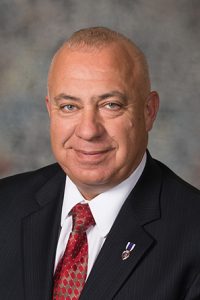Bill would provide greater access to legislative video
Nebraskans would have expanded access to video of legislative proceedings under a bill heard Feb. 10 by the Executive Board.

Nebraska Public Media currently broadcasts and live-streams video coverage of legislative public committee hearings and floor debate. LB254, sponsored by Gordon Sen. Tom Brewer, would require the Executive Board to develop and maintain a publicly accessible, digital internet archive of closed-captioned video of that coverage, indexed by bill number or date, beginning with coverage of the 2025 legislative session.
Brewer said a video archive would give Nebraskans — the Unicameral’s “second house” — the ability to watch legislative proceedings at their convenience.
“We live in a world where folks are working multiple jobs,” he said, “and it is physically, in many cases, impossible to come here and be a part of that second house.”
The archive would not be considered the official record of legislative proceedings and archival video from previous years would be added as available from NPM’s prior coverage. Any government website offering access to legislative audio and video recordings would be required to notify users that such recordings cannot be used for political or commercial purposes.
The bill would authorize use of American Rescue Plan Act funds for the development and maintenance of the digital archive.
Nicole Fox testified in support of LB254 on behalf of the Platte Institute, saying Nebraska is one of only four states that does not maintain an audio or video archive of legislative proceedings. Transcripts of those proceedings are not immediately available, she said, and even Nebraskans who are able to attend public hearings may find that two bills of interest are being heard at the same time.
If they are unable to watch real-time coverage of the Legislature, Fox said, Nebraskans must rely on secondhand accounts of the policy decisions being made.
“Sometimes these secondhand accounts may only be short snippets, they may contain biases and they may not … reflect the true context of the issue that is being heard or debated,” she said.
Mikel Lauber testified in support of the bill on behalf of Media of Nebraska, saying the volume of lawmakers’ work makes it impossible for the media to cover it all.
“[An archive] would provide historical context that could be referenced and researched for years to come,” he said, “and it would be a tool for journalists in the Nebraska news media who may want to view or review debates and hearings to better inform their reporting.”
Also in support was Heidi Uhing of Civic Nebraska. She said an archive would allow nonprofits, schools, the media and advocacy groups to educate Nebraskans about policy and the legislative process.
“The fact is that what you do here is interesting to people,” Uhing said, “and it’s an appropriate courtesy to the public to make viewing it accessible.”
Brandon Metzler, clerk of the Legislature, provided neutral testimony on the proposal. He recommended that lawmakers omit the provision requiring notification that recordings could not be used for political or commercial purposes, as similar restrictions in other states have been found to violate the First Amendment.
If LB254 is implemented, Metzler suggested that the Executive Board create a policy specifying how long video would be retained and which measures, such as a watermark, would be used to deter others from using footage in political attack ads.
The committee took no immediate action on the bill.

